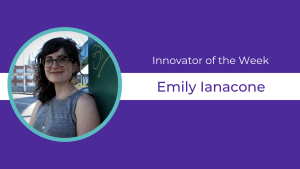Crafting resident-informed messaging for the COVID-19 era

Name: Emily Ianacone
Title: Deputy Director and Design Lead, Mayor’s Office of Performance & Innovation
City: Baltimore
With a background in human-centered design, Emily Ianacone is used to working closely with the community and service-delivery workers to shape Baltimore’s approach to problem solving. So when she went to work on the city’s COVID-19 messaging on social distancing, she knew she’d need to tap into residents’ knowledge. Early on, she and members of the city’s Joint Information Center held a focus group with community leaders over Zoom. One participant from a predominantly African-American area spoke about how there’s a culture of sharing things in her neighborhood — a generous quality in more normal times that poses risks of virus transmission now.
In response, Ianacone designed a simple graphic with three icons. Next to a cigarette, it said: “Don’t Pass It, You Could Get It.” Next to a water bottle, it said: “Don’t Share It, You Could Give It.” Next to two shaking hands, it said: “Don’t Dap It, You Could Die.” Focus-group members not only responded positively to the graphic but also volunteered to distribute 16,000 cards printed with it in their neighborhoods.
“We’re really working to make sure that our messages are very resident-informed,” Ianacone said, “and working with credible messengers on the ground to disseminate printed materials.” Ianacone and her team are also using social media to stay plugged into what’s on residents’ minds. As weather began warming up a couple of weekends ago and there was a lot of social media chatter about planning cookouts, she responded with a popular “yes/no” meme featuring the musician Drake. The message: It’s OK to have a cookout with the people you live with, but don’t invite all your friends and relatives. The post from the city’s Health Department was widely shared and a local news station ran a story on it.
“We do a lot of social-media monitoring, just seeing what people are talking about online, seeing what they’re sharing and liking,” Ianacone said. “Knowing that we were trying to target a younger audience of people who were making plans on social media, we figured a meme would work.”
Pro tip: “During a crisis, it can be really challenging to find ways to be resident-informed, but there are ways to do it, and it’s so important to get that feedback from residents early and often to understand what’s working and how the city can improve.”

